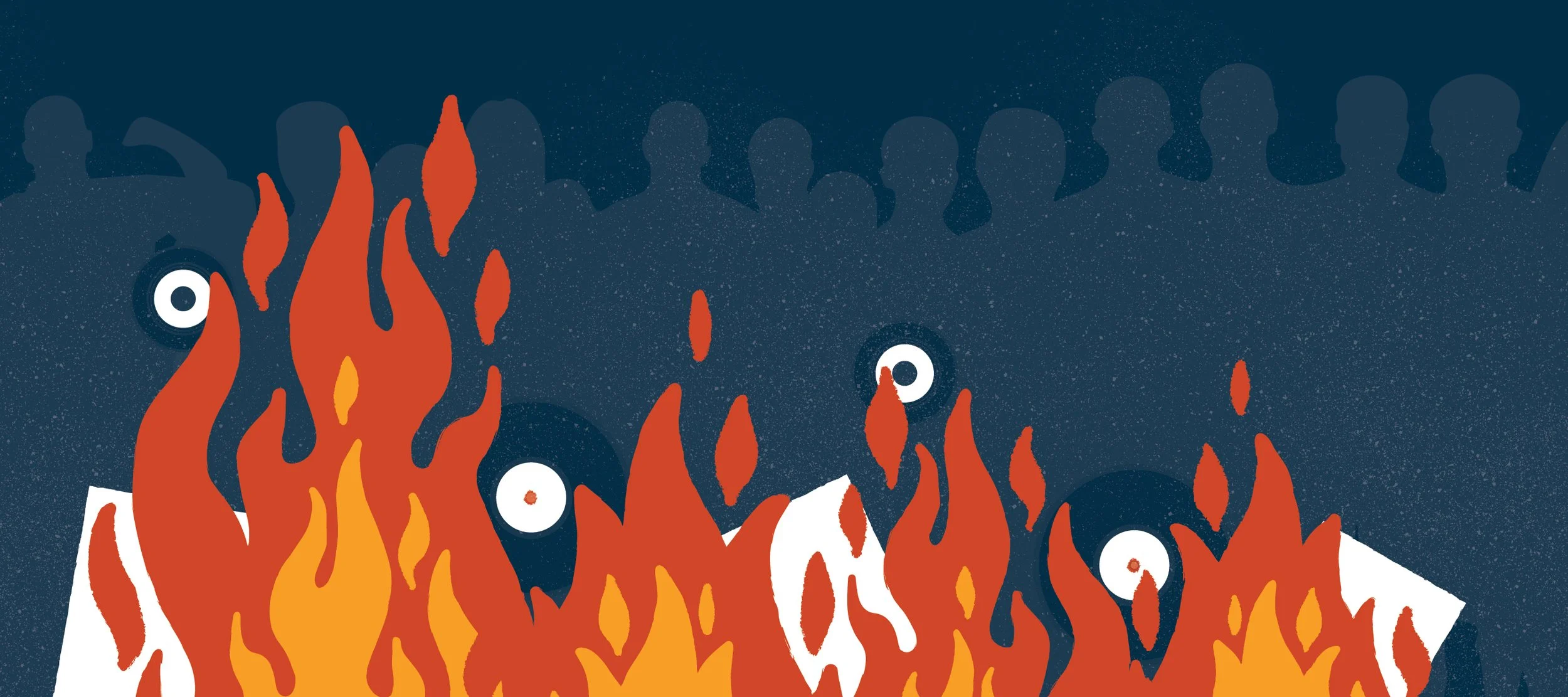The Beatles vs. Jim Crow
When the Beatles landed in America, they brought more than music — they brought a quiet revolution. The year was 1964, and while the British Invasion was shaking up the airwaves, the United States was still firmly in the grip of Jim Crow. Segregation defined public life, and even the passage of the Civil Rights Act hadn’t erased centuries of discrimination overnight. What the British didn’t anticipate, though, was that their tour of America would force them to confront that reality — and to take a stand against it.
The Beatles. Illustration by J.D. Humphreys
• BEATLES ISSUE A DECLARATION •
“We will not appear unless Negroes are allowed to sit anywhere.”
That was the Beatles’ declaration on September 6, 1964, just days before their scheduled performance at Jacksonville’s Gator Bowl. When the band learned that the venue was segregated, they refused to play until local officials confirmed that the audience would be integrated. “We never played to segregated audiences and we aren’t going to start now,” John Lennon insisted. “I’d sooner lose our appearance money.”
As the group made their way from Montreal to Jacksonville, Hurricane Dora diverted their flight to Key West. When they finally reached Florida, they found that their hotel accommodations had been canceled — the Hotel George Washington refused to host them due to its segregation policy. George Harrison didn’t mince words when asked about it: “We don’t know about our accommodations at all. We don’t arrange that. But you know, we don’t appear anywhere there is [segregation].”
Beatles historian Chuck Gunderson later explained the context. “The George Washington kind of frowned on integration,” he said. “The Beatles traveled with African American support acts that were African American. You had Clarence ‘Frogman’ Henry, the Exciters were with the group — these were African American artists.” Gunderson adds that the issue wasn’t the concert promoters, but the municipally owned Gator Bowl itself, whose lease provisions still reflected segregationist policies — technically illegal by then, but still embedded in practice.
The day of the Gator Bowl, the Florida Times-Union, Jacksonville’s daily paper, published a scathing editorial with the headline, “Beatlemania is a mark of a frenetic era.” The editorial called them a “passing fad” and said that “Beatle-maniacs, hopefully, will mature and in later years look back nostalgically to the time when they released their inhibitions at the singers’ signal. The frightening thought is that cultural standards will continue to decline so that they will react like today’s elders, to the noises to which their children will be listening.”
The editorial did not mention segregation. However, it was clear that the paper’s editorial was a passive-aggressive move in response to the outspoken Beatles. It was also an instance where nationalistic pride crept into the mind of Jacksonville almost asking who were these “mop-haired” young men from overseas to tell us what is right and what is wrong with our social policies?
“We never played to segregated audiences and we aren’t going to start now. I’d sooner lose our appearance money.”
- John Lennon, The Beatles
The Beatles were interlopers in the eyes of most people,” said Dr. Kitty Oliver in an article in Mental Floss. Oliver, a Jacksonville native, was one of a handful of Black teenage fans who attended their Gator Bowl concert. “They were nobodies, and strange on top of that. Especially in the South, in a place like Jacksonville, where tension was already high about differences. Whether you were coming from another state to demonstrate civil rights, or coming from another country to undermine our youth — it was equally threatening.”
And Jacksonville had good reason to feel tense. In the months after the Beatles’ first appearance on The Ed Sullivan Show and the passage of the Civil Rights Act of 1964, a bomb tore through the home of a Black family whose child had integrated a white school. Riots erupted soon after. Even a year later, fewer than one percent of Duval County’s 30,000 Black students attended integrated schools.
After the concert, the group headed to Boston.
• SETTING AN PRECEDENT FOR INCLUSIVENESS •
The band’s stance wasn’t a one-time gesture. Going forward, their management made it policy. A 1965 contract, signed by manager Brian Epstein for the Beatles’ performance at the Cow Palace in California, explicitly stipulated that they “not be required to perform in front of a segregated audience.” It was an early example of artists using their leverage to demand social accountability — along with their $40,000 performance fee attached.
Paul McCartney told a reporter in 1966: "We weren't into prejudice. We were always very keen on mixed-race audiences. With that being our attitude, shared by all the group, we never wanted to play South Africa or any places where Blacks would be separated. It wasn't out of any goody-goody thing; we just thought, 'Why should you separate Black people from white? That's stupid, isn't it?'"
“It wasn't out of any goody-goody thing; we just thought, 'Why should you separate Black people from white? That's stupid, isn't it?'"
- Paul McCartney, The Beatles
Motown started to implement policies of foregoing venues or performances that segregated audiences. When white manager Shelly Berger started managing the Temptations, he made sure there was “a clause in our contract that if the audience was not integrated, we didn’t have to play and we had to get paid.”
By 1966, performing had lost its joy for the Beatles. On the road, they were constantly swarmed by teenage fans who bypassed or exploited the minimal security. Sightseeing in any city was nearly impossible, and the deafening screams often drowned out their own vocals and instruments. On top of that, concerns for their personal safety were becoming ever more real.
Illustration by J.D. Humphreys
• KKK TARGETS THE BEATLES •
Then, on July 29, 1966, a remark by John Lennon ignited a firestorm. Months earlier, in an interview with Maureen Cleave of Datebook magazine, he had said, “We’re bigger than Jesus now.”
In the UK, it barely raised an eyebrow—but in the United States, it sparked outrage. In Birmingham, Alabama, Beatles records were burned in a chilling echo of the book burnings carried out by the Nazis decades before. Death threats poured in, threatening to cancel shows. Thirty radio stations banned their music, and in Longview, Texas, Radio KLUE staged a public record burning. In South Carolina, the Grand Dragon of the Ku Klux Klan impaled a Beatles record on a wooden cross and set it ablaze. At the Mid-South Coliseum in Memphis, KKK members dressed in white robes demonstrated violently, throwing firecrackers and objects onto the stage. The Beatles’ tour bus was even surrounded by Christian protesters, turning what should have been a rock ’n’ roll tour into a gauntlet of fury and fear.
“They were zealots. It was horrible to see the hatred on their faces,” Paul McCartney said.
“When they started burning our records… that was a real shock, they physical burning. I couldn’t go away knowing I’d created another little piece of hate in the world… so I apologized,” Lennon said.
George Harrison added, “They’ve got to buy them [records] before they can burn them.”
“They’ve got to buy them [records] before they can burn them.”
- George Harrison, The Beatles
• BEATLES AS CROSS-CULTURAL DIPLOMATS •
Mark Lindsay, lead singer of Paul Revere & the Raiders, hits at the heart of why the Beatles’ American tours mattered so much beyond music:
“At the time, no one that I knew of really took the initiative to address any kind of social issues,” he said. “I can see The Beatles coming over here and being assailed by this weird, unfair policy of segregation. They were not just good musicians. They had intellect. They spoke up.”
Indeed, the Beatles weren’t just performers—they were cultural diplomats. Kitty Oliver adds context to their impact:
“I think The Beatles did a lot in terms of bridging cultures, and that was something very new at that time,” she said. “They came from another country and another culture, so that made them intriguing to many Black people. These people were different and they were singing some R&B songs that were familiar to us. It was the cross-cultural aspect that went beyond racial issues that made them so important. They gave us a new way of dialoguing at a time when we were really at odds with each other.”
“It was the cross-cultural aspect that went beyond racial issues that made them so important.”
- Dr. Kitty Oliver, Mental Floss
Their insistence on integrated audiences, their courage in confronting segregation head-on, and their willingness to amplify voices outside their own experience weren’t mere footnotes in rock history—they were revolutionary acts. In a turbulent America, the mop-haired British invaders weren’t just shaking up the charts—they were shaking up the status quo, quietly yet powerfully insisting that music, like humanity, should know no color lines.



